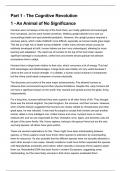Part 1 - The Cognitive Revolution
1 - An Animal of No Significance
Humans were not always at the top of the food chain; we mostly gathered and scavenged
from carcasses, and we were hunted ourselves. Walking upright allowed us to see our
surroundings better and spot potential predators. However, this upright posture required a
narrower pelvis, which made childbirth more difficult, especially as human heads grew larger.
This led to a high risk of death during childbirth. Unlike many animals whose young are
relatively developed at birth, human babies are born very undeveloped, allowing for more
learning and adaptation. The rapid rise of humans to the top of the food chain caused
significant damage to ecosystems, unlike lions and sharks whose gradual rise allowed
ecosystems time to adapt.
Humans have a large brain relative to their size, which consumes a lot of energy. This had
both advantages and disadvantages. A large brain was initially not very useful because it
came at the cost of muscle strength. In a debate, a human would outsmart a chimpanzee,
but the chimp could easily overpower a human physically.
The discovery and control of fire were major advancements. Fire allowed humans to
influence their environment beyond their physical limitations. Despite this, early humans did
not have a significant impact on the world; they roamed and spread across the globe, living
independently.
For a long time, humans believed they were superior to all other forms of life. They thought
there was the animal kingdom, the plant kingdom, the universe, and then humans. However,
when Charles Darwin suggested that humans are closely related to chimpanzees and other
great apes, he was ridiculed. It was hard for people to accept that humans are just another
animal, albeit a more intelligent one. Unlike horses and cows, humans have no close
relatives left, and we are responsible for that. Cheetahs, lions, tigers, and domestic cats are
all part of the same family. We, Homo sapiens, belong to the genus Homo but are the only
surviving species; all others have gone extinct.
There are several explanations for this. There might have been interbreeding between
species, or Homo sapiens could have driven other species to extinction by outcompeting
them for resources. It's also possible that the different species were not sexually attracted to
each other except in rare cases. Genetic mutations could have further separated the species
until Neanderthals eventually went extinct, either naturally or because Homo sapiens wiped
them out. Neanderthal DNA has been found in modern Europeans, suggesting some
interbreeding, but the more likely scenario is that Homo sapiens eradicated them.
, What if multiple human species still existed today? Would we still consider ourselves so
special? Why is it that Homo sapiens are the ones who survived? The answer lies in our
language!
2 - The Tree of Knowledge
Sapiens looked just like us but had different cognitive abilities. The first encounter between
Sapiens and Neanderthals even ended in a Neanderthal victory. However, about seventy
thousand years ago, humans began to do extraordinary things, becoming as intelligent,
creative, and sensitive as we are today. This transformation is known as the Cognitive
Revolution.
This new way of thinking and communicating happened due to a random mutation in
Sapiens, and our language played a crucial role. But why is our language so special? Many
animals have languages, but ours is incredibly flexible. With a limited number of sounds, we
can produce an infinite number of sentences with extensive information. Beyond just
conveying information, humans wanted to know about each other—gossip. Gossip creates
social bonds between people. Even today, much of what we talk about is gossip. This led to
better cooperation and the ability to imagine things that don't exist.
For both humans and chimpanzees, effective cooperation maxes out around 150 individuals.
Beyond this number, it's hard to know everyone well enough to cooperate effectively. But our
ability to imagine fictional things allowed us to collaborate with strangers. Two Catholics who
don't know each other can join a crusade because they both believe in God, the stories in
the Bible, and the Catholic faith. Our society still relies on belief in fictional constructs like
nations, human rights, and corporations.
This capacity for cooperation enabled Sapiens to change behaviors much faster than other
species. While other animals' behaviors were largely determined by their DNA, Sapiens
could rapidly adopt new behaviors through cooperation. For example, Homo erectus could
not do this, resulting in them using the same stone tools for two million years.
Cooperation is unique to humans. No other species, as far as we know, trades goods, which
requires trust and a shared belief in things like money or items of value. Sapiens also hunted
differently, driving large herds into ravines for easier slaughter. While we can cooperate even
better now, our craftsmanship skills have declined. We are more specialized in various fields
to achieve bigger things, whereas a Sapiens in the past needed to master many different
skills.
The Cognitive Revolution:
Skills:





